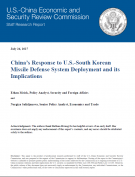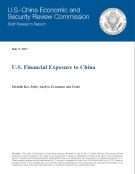×
Filter Results
Filter Results


Staff Paper
In July 2016, the United States and South Korea announced the alliance decision to deploy a U.S. Terminal High Altitude Area Defense (THAAD) antimissile battery in South Korea to defend against the increasing North Korean missile threat. The move has angered Beijing, which perceives THAAD as mostly directed at China and a regional security concern, according to its official statements. In response, Beijing has used economic coercion, among other levers, to try to compel Seoul to abandon the THAAD deployment, but these efforts have proven unsuccessful. This report includes an overview of the THAAD system and its deployment, China’s stated concerns about THAAD, and China’s array of pressure directed against South Korea. It also examines the implications of China’s forceful response to the deployment for the United States and the geopolitical landscape in the Asia Pacific.

Research
USCC Staff have compiled a table of World Trade Organization (WTO) cases brought by the United States against China from data provided by the WTO.

Research
USCC Staff have compiled a table of World Trade Organization (WTO) cases brought by China against the United States from data provided by the WTO.



Research
The U.S.-China Economic and Security Review Commission invites submission of proposals to provide a one-time unclassified report on supply chain vulnerabilities from China in U.S. federal information technology (IT) procurement. Electronic or hard-copy proposals must be received by 5:30PM (EST) on June 14, 2017.

Staff Paper
China’s direct financial linkages with the United States have been growing but remain very modest when compared to the two countries’ trade linkages. Beijing has taken steps to gradually open its financial sector to foreign investors, but U.S. investors have displayed little interest since the reforms are happening as Chinese policymakers impose tighter restrictions on foreign currency conversions and outbound capital flows. Economic and financial developments in China can affect U.S. financial markets more substantially through indirect channels, as was evident in the reaction of U.S. equities to China’s stock market crashes in 2015 and 2016. More broadly, the impact of China’s slowing growth and economic reforms on trade, commodities demand, and investor confidence affects global financial markets, which in turn influence U.S. financial markets.

China Bulletin
Presidents Trump and Xi agree to reform a flagship bilateral dialogue

Research
The U.S.-China Economic and Security Review Commission invites submission of proposals to provide a one-time unclassified report on China’s development of advanced weapons. Electronic or hard-copy proposals must be received by 5:30PM (EST) on May 30, 2017.
